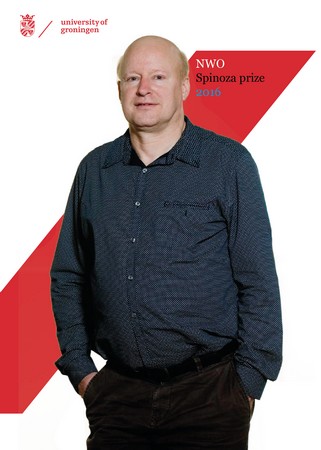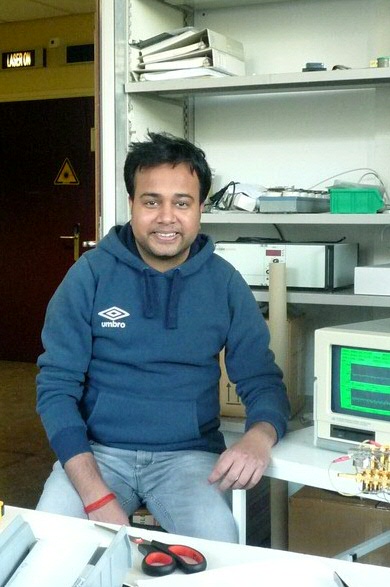van Wees Lab: Nieuwe meting RUG-wetenschappers brengt spintransistor binnen bereik
Natuurkundigen Siddhartha Omar en prof. dr. ir. Bart van Wees van de Rijksuniversiteit Groningen (RUG) hebben aangetoond dat het mogelijk is de levensduur van elektronenspins in grafeen te beïnvloeden. Zij gebruikten wolfraam disulfide om zogeheten spin-baan koppeling te bewerkstelligen in grafeen, die met een elektrisch veld was af te stellen. Hun werk bevestigt dat het mogelijk is om revolutionaire spintransistoren van grafeen te maken, een cruciaal onderdeel voor op spin gebaseerde elektronica (de zogeheten spintronica). De resultaten zijn deze week gepubliceerd in Physical Review B .


Spintronica zou een energiezuinig alternatief voor gewone elektronica kunnen zijn. Dit werkt niet via een ladingsstroom maar een zogeheten spinstroom. Die spin is een kwantummechanische eigenschap van elektronen. RUG-Hoogleraar Fysica van nanodevices (tevens Spinozaprijswinnaar) Bart van Wees: "Je kunt die elektronen zien als kleine balletjes die om hun as draaien, waardoor ze zich als kleine magneetjes gedragen. De spin kan twee waarden hebben, ‘op’ of ‘neer’, waardoor je er informatie mee kan opslaan of versturen."
Manipuleren
Grafeen, de tweedimensionale vorm van koolstof, is een uitstekende geleider van spinstromen. Het lijkt een ideaal materiaal voor spintronica, behalve dan dat het erg lastig is om de spinstroom in grafeen te manipuleren; bijvoorbeeld aan/uit schakelen. Eerder werk uit het lab van Bart van Wees, heeft laten zien dat het mogelijk is spins in grafeen te beïnvloeden door een laag materiaal met zware atomen op het grafeen te leggen.
Magnetisch veld
Zijn promovendus Siddhartha Omar heeft nu een strookje grafeen bovenop een stukje wolfraam disulfide gelegd. Eerst onderzocht hij eerdere claims dat het wolfraam de spins uit het grafeen zou trekken. Zijn metingen lieten zien dat dit niet het geval is, maar dat de levensduur van de spins in het grafeen wel afneemt door de nabijheid van zware atomen. "De elektronen die dicht bij de wolfraam atomen zitten, voelen een magnetisch veld, dat trekt aan de elektronen in het grafeen en daardoor hun spinrichting kan beïnvloeden." Dit fenomeen heet spin-baan koppeling. Vervolgens zette Omar een spanning op zijn constructie waardoor een elektrisch veld ontstond. "Met dit veld konden we de richting aanpassen van het magnetisch veld dat het wolfraam veroorzaakt. En door die verandering maken we de spin-baan koppeling sterker of zwakker. Daardoor konden we de levensduur van de spins in grafeen afstellen."
Basisprincipes
Hoewel dit nog niet in de praktijk is gebracht, zou het verkorten van de levensduur van de spinstroom een manier zijn om die stroom uit te zetten. "Dus wat we nu hebben aangetoond is dat we spin-baan koppeling kunnen krijgen in grafeen en dat we daarmee in staat zijn de spin relaxatie, het verdwijnen van de spinstroom, te controleren. Dat zijn de twee basisprincipes die nodig zijn om een spintransistor te maken." Voor zover Omar weet heeft nog niemand een echte werkende spintransistor gebouwd. "Maar theoretische modellen beschrijven hoe dat zou kunnen. Dat zal zeker onze volgende stap zijn."
Over de bijgevoegde video: Spintronica – tollende elektronen straks in je mobiel.
Computerchips krijgen steeds meer rekenkracht. Dat kan, omdat de schakelingen op de chips steeds kleiner worden. Alleen is de grens van die verkleining in zicht. Warmteproductie door de chips is ook een probleem. Wetenschappers zoeken naar een oplossing die snellere, zuiniger computerchips kan opleveren, bv. voor onze mobieltjes. Spintronica (spintronics), een vorm van elektronica die gebaseerd is op de magnetische eigenschappen van elektronen in plaats van hun lading, is een van de opties. Professor Bart van Wees van de Rijksuniversiteit Groningen werkt er hard aan om dit werkelijkheid te maken.
Noot voor de redactie:
Over de illustratie: The Weerstandmodel, by Omar et al. Phys Rev B
Referentie: S. Omar and B.J. van Wees: Spin transport in high-mobility graphene on WS2 substrate with electric-field tunable proximity spin-orbit interaction. Physcial Review B, 16 January DOI: 10.1103/PhysRevB.97.045414
Lees meer over het onderzoek van hoogleraar Fysica van Nanodevices Bart van Wees op de website van de Rijksuniversiteit Groningen.
-
Neem voor meer informatie contact op met: RUG-Woordvoerders Gernant Deekens of Jorien Bakker
